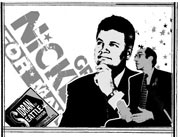SEATTLE CAME through the primary election knowing one thing about mayoral candidate Mark Sidran—he intends to scrap Sound Transit’s proposed light-rail project.
Well, maybe he does. The incumbent city attorney is now airing a pair of television commercials assuring voters he loves light rail and that once he reins in the Sound Transit bureaucracy, he’ll demonstrate that love by laying track.
It’s a major issue: Sidran spent $205,000 on television advertising in the primary and plans to purchase a similar amount of TV time before the final election, both records for a Seattle mayoral election. Depending on how much of his personal fortune Sidran is willing to sink into the race (he’s already pledged some $100,000), the candidate could spend up to 60 percent of his campaign funding on TV spots. All four of Sidran’s television ads so far have made reference to Sound Transit.
In his two newest ads, Sidran pledges to “build a light-rail system that gets us somewhere” and questions Greg Nickels’ ability to oversee the light-rail construction process, ending up with a position roughly equivalent to lame-duck Mayor Paul Schell’s “mend it, don’t end it” stand on light rail. Sidran’s shifting stand on Sound Transit tends to indicate that some voters see him as being against public transit, as KIRO-AM radio host Dave Ross indicated during a recent on-air debate between the two candidates. “Do you want to assure people that you do believe in some sort of mass transit system?” Ross asked Sidran.
The irony, of course, is that the slow-moving Nickels campaign has finally found a benefit to standing still. “I will build light rail” has long been Nickels’ campaign mantra. But given Sound Transit’s inability to build the system it originally sold the voters, the agency’s longtime finance chair Nickels’ only advantage in the light-rail sweepstakes is that he has a plan to support. Sidran is now learning the sad reality of the populist: It’s far easier to be a critic of someone else’s plan than it is to establish your own.
In May, Sidran declared the death of the current 14-mile proposed Sound Transit line from SeaTac to the Convention Center, but the candidate’s only real crack at a light-rail proposal of his own is the cautious declaration that he’d prefer an initial segment that connects with North Seattle. “I don’t think that [the proposed system] has value in the absence of an ability to go north,” he said during the KIRO-AM debate.
Sidran’s most substantial transportation stand to date is his call for the direct election of Sound Transit board members. Nickels replies that simply creating a new set of elected officials won’t necessarily add accountability; he cites the Port of Seattle, which has largely escaped public scrutiny despite being run by five commissioners elected on a countywide basis.
Sidran’s television ads also claim that he’ll shift more money to Sound Transit’s express buses, which currently move some 20,000 residents throughout the transit agency’s tri-county coverage area. However, given his vow to scrap the current plan and start planning anew, it’s unclear if he can find savings in Sound Transit’s $2.6 million monthly costs to fund additional bus service.
Sidran’s supporters still insist that their candidate can look at the Sound Transit situation with fresh eyes and that, unlike his opponent, he isn’t weighed down by past promises. But in touting his “three questions” approach to light rail—Where should it go, how much will it cost, and how should we pay for it?—Sidran has left himself open to Nickels’ charge that his opponent is really calling for “more studies, more votes, more delays.”
Ironically, before following Nickels into the bottomless political pit that is Sound Transit, Sidran was trumping his opponent on the campaign trail. Nickels is a traditional happy liberal on the stump, giving general support to just about every proposal that comes up. Sidran has played the budget hawk, reminding voters that the new mayor will be called upon to cut budgets, not pad them. “I’m fairly reserved in making promises that I can’t deliver on,” he has said.
Sidran has also stuck closely to his theme that he’s the tough mayor the city needs in these terrorist-ridden times.
Nickels, who has cut budgets before as a King County Council member, says he’ll demand a “menu” of possible budget cuts from his department heads. He notes that the city added 938 new staff members under the Schell administration. “I’m going to go and peel back the onion— see what was added, see what was necessary,” he said.
But neither candidate seems able to cite specific programs or departments that will bear the brunt of the budget-cutting ax.
Conventional wisdom still dictates that voters will favor the decisive mayoral candidate—now they just have to figure out who that is.






